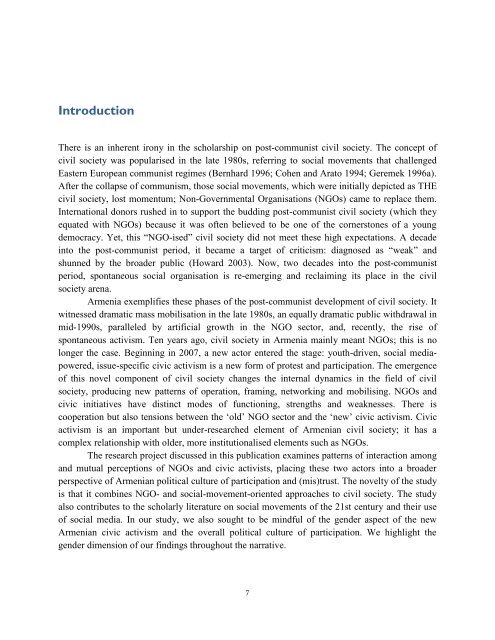Civic Activism as a Novel Component of Armenian Civil Society
English-3
English-3
You also want an ePaper? Increase the reach of your titles
YUMPU automatically turns print PDFs into web optimized ePapers that Google loves.
Introduction<br />
There is an inherent irony in the scholarship on post-communist civil society. The concept <strong>of</strong><br />
civil society w<strong>as</strong> popularised in the late 1980s, referring to social movements that challenged<br />
E<strong>as</strong>tern European communist regimes (Bernhard 1996; Cohen and Arato 1994; Geremek 1996a).<br />
After the collapse <strong>of</strong> communism, those social movements, which were initially depicted <strong>as</strong> THE<br />
civil society, lost momentum; Non-Governmental Organisations (NGOs) came to replace them.<br />
International donors rushed in to support the budding post-communist civil society (which they<br />
equated with NGOs) because it w<strong>as</strong> <strong>of</strong>ten believed to be one <strong>of</strong> the cornerstones <strong>of</strong> a young<br />
democracy. Yet, this “NGO-ised” civil society did not meet these high expectations. A decade<br />
into the post-communist period, it became a target <strong>of</strong> criticism: diagnosed <strong>as</strong> “weak” and<br />
shunned by the broader public (Howard 2003). Now, two decades into the post-communist<br />
period, spontaneous social organisation is re-emerging and reclaiming its place in the civil<br />
society arena.<br />
Armenia exemplifies these ph<strong>as</strong>es <strong>of</strong> the post-communist development <strong>of</strong> civil society. It<br />
witnessed dramatic m<strong>as</strong>s mobilisation in the late 1980s, an equally dramatic public withdrawal in<br />
mid-1990s, paralleled by artificial growth in the NGO sector, and, recently, the rise <strong>of</strong><br />
spontaneous activism. Ten years ago, civil society in Armenia mainly meant NGOs; this is no<br />
longer the c<strong>as</strong>e. Beginning in 2007, a new actor entered the stage: youth-driven, social mediapowered,<br />
issue-specific civic activism is a new form <strong>of</strong> protest and participation. The emergence<br />
<strong>of</strong> this novel component <strong>of</strong> civil society changes the internal dynamics in the field <strong>of</strong> civil<br />
society, producing new patterns <strong>of</strong> operation, framing, networking and mobilising. NGOs and<br />
civic initiatives have distinct modes <strong>of</strong> functioning, strengths and weaknesses. There is<br />
cooperation but also tensions between the ‘old’ NGO sector and the ‘new’ civic activism. <strong>Civic</strong><br />
activism is an important but under-researched element <strong>of</strong> <strong>Armenian</strong> civil society; it h<strong>as</strong> a<br />
complex relationship with older, more institutionalised elements such <strong>as</strong> NGOs.<br />
The research project discussed in this publication examines patterns <strong>of</strong> interaction among<br />
and mutual perceptions <strong>of</strong> NGOs and civic activists, placing these two actors into a broader<br />
perspective <strong>of</strong> <strong>Armenian</strong> political culture <strong>of</strong> participation and (mis)trust. The novelty <strong>of</strong> the study<br />
is that it combines NGO- and social-movement-oriented approaches to civil society. The study<br />
also contributes to the scholarly literature on social movements <strong>of</strong> the 21st century and their use<br />
<strong>of</strong> social media. In our study, we also sought to be mindful <strong>of</strong> the gender <strong>as</strong>pect <strong>of</strong> the new<br />
<strong>Armenian</strong> civic activism and the overall political culture <strong>of</strong> participation. We highlight the<br />
gender dimension <strong>of</strong> our findings throughout the narrative.<br />
7



